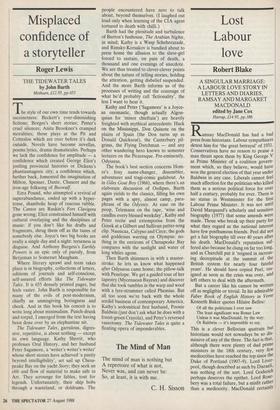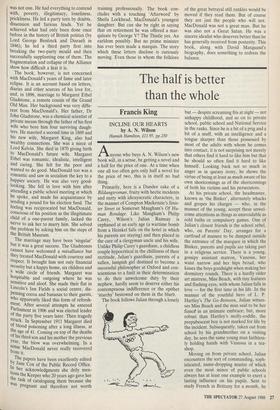Lost Labour love
Robert Blake
A SINGULAR MARRIAGE: A LABOUR LOVE STORY IN LETTERS AND DIARIES, RAMSAY AND MARGARET MACDONALD edited by Jane Cox
Harrap, £14.95, pp.386
Ramsay MacDonald has had a bad press from historians. Labour sympathisers detest him for 'the great betrayal' of 1931. Conservatives have no reason to praise a man thrust upon them by King George V as Prime Minister of a coalition govern- ment which, so they believe, would have won the general election of that year under Baldwin in any case. Liberals cannot feel much affection for the politician who killed them as a serious political force for over half a century, probably for ever. There is no statue in Westminster for the first Labour Prime Minister. It was not until David Marquand's scholarly and sensitive biography (1977) that some amends were made. Those who break up their party for what they regard as the national interest have few posthumous friends. Peel did not get a fair biography till over 40 years after his death. MacDonald's reputation suf- fered also because he clung on far too long, and as Churchill put it 'reigned in increas- ing decrepitude at the summit of the British system for nearly four fateful years'. He should have copied Peel, res- igned as soon as the crisis was over, and left others to deal with the aftermath.
But a career like his cannot be written off as negligible or trivial. In his admirable Faber Book of English History in Verse Kenneth Baker quotes Hilaire Belloc:
Of all the politicians I ever saw The least significant was Bonar Law Unless it was MacDonald, by the way: Or Baldwin — it's impossible to say.
This is a clever Bellocian quatrain but historians would not nowadays be so dis- missive of any of the three. The fact is that, although there were plenty of dud prime ministers in the 18th century, very few mediocrities have reached the top since the Duke of Portland (1907-9). Lord Liver- pool, though described as such by Disraeli, was nothing of the sort. Lord Goderich perhaps deserves the epithet. Lord Rose- bery was a total failure, but a misfit rather than a mediocrity. MacDonald certamlY
was not one. He had everything to contend with, poverty, illegitimacy, loneliness, prickliness. He led a party torn by doubts, dissension and furious feuds. Yet he achieved what had only been done once before in the history of British politics (by Lord George Bentinck and Disraeli in 1846); he led a third party first into breaking the two-party mould and then successfully supplanting one of them. The fragmentation and collapse of the Alliance show how difficult a feat it is.
The book, however, is not concerned with MacDonald's years of fame and later eclipse. It is an account based on letters, diaries and other sources of his love for, and, in 1896, marriage to Margaret Ethel Gladstone, a remote cousin of the Grand Old Man. Her background was very diffe- rent from MacDonald's. Her father, Dr John Gladstone, was a chemical scientist of private means through the father of his first wife who bore him four surviving daugh- ters. He married a second time in 1869 and his new wife, Margaret King, also had wealthy connections. She was a niece of Lord Kelvin. She died in 1870 giving birth to MacDonald's future wife. Margaret Ethel was romantic, idealistic, intelligent and caring. She felt for the poor and wanted to do good. MacDonald too was a romantic and saw in socialism the key to a happier society. He was also very good- looking. She fell in love with him after attending a public school meeting at which he spoke, and made his acquaintance by sending a pound for his election fund. The feeling was reciprocated but MacDonald, conscious of his position as the illegitimate Child of a one-parent family, lacked the nerve to ask her to marry him. She solved the problem by asking him on the steps of the British Museum.
The marriage may have been 'singular' but it was a great success. The Gladstones cannot have welcomed a misalliance but they treated MacDonald with courtesy and respect. It brought him not only financial security but a happy home, six children and a wide circle of friends. Margaret was hospitable and outgoing where he was sensitive and aloof. She made their flat in Lincoln's Inn Fields a social centre, dis- Pensing cocoa and bananas to their guests, Who apparently liked this form of refresh- ment. After several attempts he entered Parliament in 1906 and was elected leader of the party five years later. Then tragedy struck. In September 1911 Margaret died of blood poisoning after a long illness, at the age of 41. Coming on top of the deaths of his third son and his mother the previous Year, the blow was overwhelming. In a sense MacDonald never really recovered from it.
The papers have been excellently edited bY Jane Cox of the Public Record Office. I.a her acknowledgments she drily men- tions the Keeper who 20 years ago gave her the task of cataloguing them because she was pregnant and therefore not worth
training professionally. The book con- cludes with a touching `Afterword' by Sheila Lockhead, MacDonald's youngest daughter. But can she be right in saying that on retirement he was offered a mar- quisate by George V? The Thistle yes. An earldom possibly. But no prime minister has ever been made a marquis. The story which these letters disclose is curiously moving. Even those in whom the folklore of the great betrayal still rankles would be moved if they read them. But of course they are just the people who will not. MacDonald was not a great man. But he was also not a Great Satan. He was a sincere idealist who deserves better than he has generally received from posterity. This book, along with David Marquand's biography, does something to redress the balance.















































 Previous page
Previous page